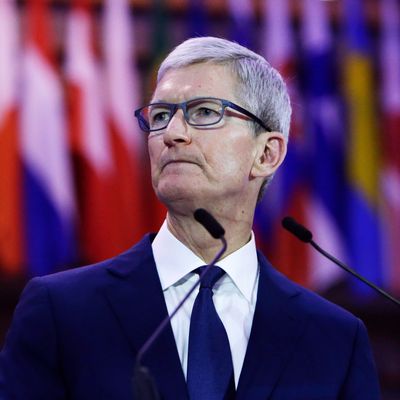
At a privacy conference in Brussels this week, Apple CEO Tim Cook came out in favor of government regulation. More specifically, he came out in support of privacy legislation. “Platforms and algorithms that promised to improve our lives can actually magnify our worst human tendencies,” he told the crowd, citing deepening political polarization and attempts to “undermine our shared sense of what is true and what is false.”
He then praised the E.U.’s GDPR regulations and added that, “We at Apple are in full support of a comprehensive federal privacy law in the United States.” Cool! Me too. There is a lot of civic good that would come from privacy regulations that give users greater control over their personal data and more information about how it is used.
Also, coincidentally, privacy regulations would weaken Apple’s competitors. Sure, I don’t need to tell you that Apple, the most valuable company on the planet, is a company that is very focused on making money. The margins on Apple phones and computers are significant. Apple’s accountants use, uh, creative practices to help the company avoid paying its fair share of taxes. We know this.
But Apple’s business is not built on social networking, and it’s not built on ads. Privacy regulations wouldn’t really affect Apple as heavily as they would companies like Facebook or Google because the company is not constantly crunching your personal data in order to serve up targeted ads with precision. As much as possible, Apple has stated, it tries to process data locally on devices, rather than sending it to the cloud (a remote server) for processing. That’s good operations security. Another example: iMessage is encrypted by default, unlike similar messaging services from Facebook or Google, which prefer unencrypted text so that it can be analyzed for better ad targeting. Apple can do all this because it makes most of its money from hardware and subscription services. Android, the only real competitor to iOS, is a more open system than Apple’s — the trade-off of this is that it is also more likely to encounter cybersecurity problems.
What a “comprehensive federal privacy law” would do is increase the overhead of data-hungry companies like Google and Facebook, forcing them to devote resources to security and compliance instead of other pursuits, like R&D. It might even make current methods of targeting users with ads more difficult or unfeasible.
The current crisis in tech — reckoning with the power that megaplatforms hold over our lives — has presented plenty of opportunities for Apple to take the high road. Their actions against Alex Jones, for instance, finally forced places like Facebook and YouTube to stop tip-toeing around the conspiracy theorist’s actions on their platforms.
Cook and his leadership team are able to make decisions like this, or endorse privacy regulation, because they pose no real threat to Apple’s bottom line. Apple makes most of its money when you purchase your phone, not because you keep using it. For all of Cook’s talk about how privacy regulations are good for society, he probably also knows that they’d be a significant burden for Apple’s competitors. I wonder how Tim Cook feels about anti-trust.





























